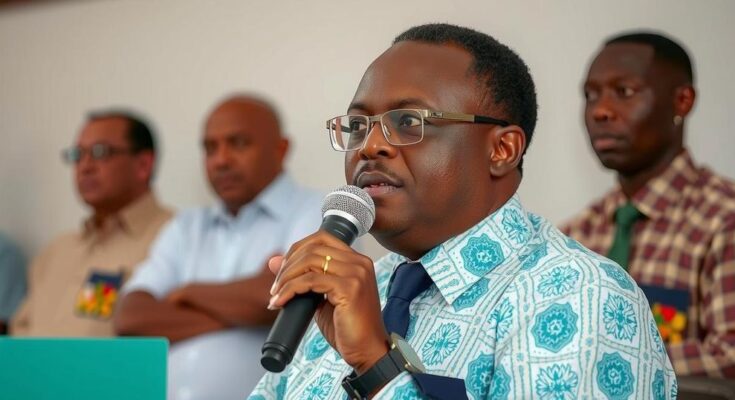Ghana is poised for a presidential election amid economic crisis and discontent among voters. The election pits former president John Dramani Mahama against Vice President Mahamudu Bawumia, as citizens seek a leader capable of addressing inflation, high living costs, and environmental degradation. Youth voter engagement is crucial, reflecting anger over government performance and demanding change.
Ghana is at a critical electoral juncture as it heads into its presidential election, where voters are faced with a decision between two prominent candidates: former president John Dramani Mahama, who previously served one term and was ousted in 2016, and current Vice President Mahamudu Bawumia, a protégé of outgoing President Nana Akufo-Addo. The election is overshadowed by a significant economic crisis, characterized by rising inflation, escalating costs of living, and unemployment. The electorate is deeply concerned about these economic challenges, influencing their choice on Saturday as they look for a capable leader to restore economic stability.
The socio-political landscape indicates that both candidates represent the two major political parties in Ghana, the New Patriotic Party (N.P.P.) and the National Democratic Congress (N.D.C.), which have alternated power since the country embraced multiparty democracy in 1992. Analysts suggest that the ideological differences between the candidates are minimal, as both hail from the historically marginalized northern region of Ghana, marking a significant moment in the country’s political dynamics. Young voters, especially first-time participants, are particularly motivated by the pressing issues of environmental degradation and the government’s perceived ineffectiveness in addressing these challenges, notably the illegal mining practices known as “galamsey.”
Furthermore, Ghana has established a reputation as a stable democracy within a volatile West African region. Although the country has largely evaded direct security threats, it has been reported that Ghana is being utilized as a refuge for militants from neighboring areas. This context adds another layer of concern for voters as they approach the elections. John Dramani Mahama appears to be the leading candidate based on polling results, but Mahamudu Bawumia’s incumbency may help him with electoral challenges despite the economic difficulties they face. The elections will take place on December 7, with over 18 million registered voters participating in a process characterized by high voter turnout and a demand for change amid economic hardship.
Ghana is facing economic turmoil with inflation rates climbing and living standards deteriorating, prompting widespread public discontent. Historically recognized for its democratic resilience, the nation is now grappling with challenges that threaten its stability and growth, particularly following a borrowing spree that resulted in defaults on debt payments. The importance of the upcoming election is amplified as it offers a chance for citizens to select a leader who can effectively address these pressing economic and environmental issues, especially impacting the youth population who are increasingly vocal and politically active.
In conclusion, the upcoming election in Ghana serves as a critical moment for voters disillusioned by economic hardships and environmental concerns. With a choice between the former president seeking redemption and the vice president who has overseen the current dire situation, the electorate is positioned to influence Ghana’s future significantly. The engagement of young voters is particularly noteworthy and may determine the election outcome as they demand accountability and sustainable solutions to their pressing challenges.
Original Source: www.nytimes.com




